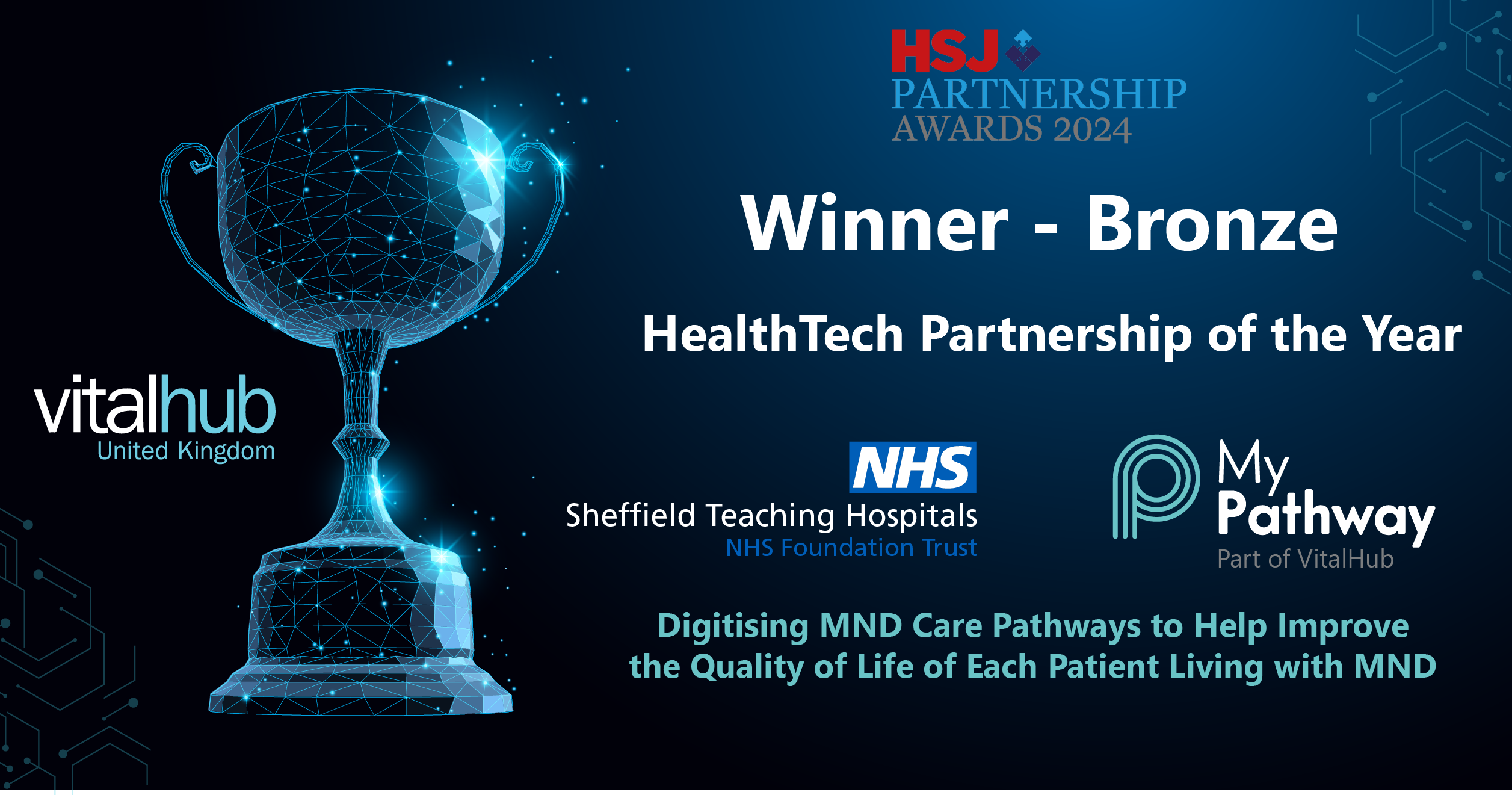blog
-Awards
Patient Activity
HSJ Bronze Award for MyPathway & Sheffield Teaching Hospital

We are thrilled to announce that My Pathway has been honoured with the Bronze Healthtech Partnership of the Year award in the prestigious HSJ Partnership Awards, in collaboration with Sheffield Teach Hospital.
Our groundbreaking project, ‘Digitising MND Care Pathways to help improve the quality of life of each patient living with MND’ has been recognised for its commitment to improving the quality of life for every patient living with Motor Neurone Disease.
This achievement is a testament to our dedication to innovation, healthcare excellence, and patient-centered care. We are proud to continue our mission of making a positive impact in the healthcare industry.
The Project:
Motor Neurone Disease is a cruel and debilitating illness that eventually takes its victims’ lives. Its rapid progression means, often, a finite window of time exists where a specific care intervention can be delivered to a patient to ensure they are as comfortable as possible and maintain some quality of life before they pass.
Sheffield University Hospitals (SUH) had identified that face-to-face appointments were severely limiting the quality of care received by terminally ill MND patients in the following ways:
- Travelling to hospital becomes extremely difficult and, often, impossible for patients as mobility decreases rapidly as the disease progresses. This is a particular problem for patients living more rurally
- Face-to-face appointments are not regular enough to identify crucial care interventions in a timely manner, e.g., if a patient is identified as requiring a wheelchair at their hospital appointment, by the time they receive it, they have often deteriorated to the point where they require a specialist or computerised wheelchair. The finite window if time has been missed.
- There are currently geographic restrictions on MND care trials – patients are not eligible to take part if the trust they are assigned to is not taking part. This prevents patients accessing every possible care intervention, and is slowing down finding a cure for MND
- The overall slow and disconnected nature of MND care currently is not fit for purpose for patients with this terminal disease, for which the average life expectancy is two years.
SUH approached MyPathway to develop and customise its remote patient monitoring app, known as ‘TiM’, to include a new clinical dashboard, patient questionnaires, and health parameters – specifically for patients living with MND.
The aim was to instigate a major digital process change, and redesign TiM to facilitate the capture of crucial patient health information directly from MND patients, from their homes, to allow care teams to better plan the key care intervention trajectory and access all the information required to improve quality of remaining life for these terminally ill patients.
SUH sought external support to develop the solution due to a lack of time, expertise, and internal resources.
The SUH and MyPathway teams collaborated to develop the app, creating a new dashboard and interface, and re-designing its functionality to capture specific information related to MND progression, such as the patient’s functioning levels relating to leg and arm movement, speech, strength, and swallow function.
The very nature of MND and the physical and emotional impact it has on patients and their families means this project has never been focused on improving patient outcomes, as unfortunately, there is only one.
Instead, its objective is to improve the quality of life of each patient living with a disease for which the average life expectancy after diagnosis is just two years – by delivering the right care intervention at the right time, missing no opportunity to help an MND patient feel more comfortable and dignified.
By using TiM and real-time information submitted through TiM by the patient, clinicians have been able to plan the patient’s care trajectory to ensure they have a tube fitted in precisely the right window of time.
TiM has been well-received by MND patients:
- MND Dashboard accounts have been created by around 70% of MND patients invited by SUH to use the system
- 85% of MND patients are completing the MND Dashboard questionnaire, increasing to 98% when the patient has used the system for 6+ months
- Over 100,000 patient-reported outcome measures have been collected via TiM to date – demonstrating excellent patient engagement and the value patients see in using the dashboard
Dr Liam Knox, BSc., PhD, Research Fellow in the Department of Neuroscience at University of Sheffield, explains: “We have asked MND patients and their carers what they think of the system and have found extremely high acceptability, as measured by the Theoretical Framework of Acceptability. ‘Easy to use, ‘user-friendly’, and ‘high confidence’ were the main acceptability measures from the users asked.”
Staff were trained remotely via video calls due to COVID, but MyPathway is intuitive, and Liam acted as a super-user inside the organisation to support face-to-face training support requirements.
Mike Sanders, CEO of VitalHub UK, described this achievement as “a remarkable advancement in fostering innovative partnerships. We are proud to continue our mission of making a positive impact in the healthcare industry and improving patient outcomes, especially those living with conditions such as MND.”
For more information on this project, please email us a mypathway@vitalhub.com